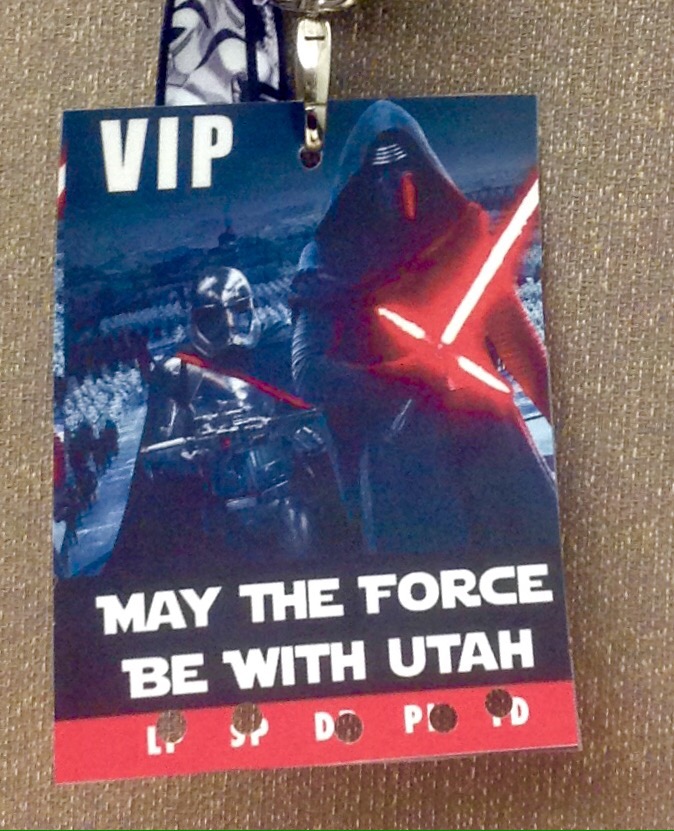As I look back over 2015, my most popular posts, the ones that really seemed to connect with readers, had two things in common; they were times I talked about being vulnerable and they tied in my friend Howard Tayler and his comic Schlock Mercenary. I’ve already mentioned that by far the most popular posts were earlier this month when I interviewed Howard and his wife Sandra about running a small business.
The most popular post from other than that week, tied in similar themes. I tied together my worst job experience, where I tried unsuccessfully to get out of the computer business, to Howard’s change when he successfully left the computer business. But, it’s not just that we left. How we chose to leave is what made the difference between his success and my failure.
Thanks for a wonderful year. It’s been, by far this blog’s most successful year. Thanks to those people I’ve interviewed, and especially to those of you who’ve shown up everyday to read my scribblings. Here’s to an even better 2016 for each of you. And here is the most popular post, sort of, from 2015:
How I Wrecked by Making a Hard left Turn at 40.
Rodney M Bliss is an author, columnist and IT Consultant. His blog updates every weekday at 7:00 AM Mountain Time. He lives in Pleasant Grove, UT with his lovely wife, thirteen children and grandchildren.
Follow him on
Twitter (@rodneymbliss)
Facebook (www.facebook.com/rbliss)
LinkedIn (www.LinkedIn.com/in/rbliss)
or email him at rbliss at msn dot com(c) 2015 Rodney M Bliss, all rights reserved
Josh Ostrovsky is an entertainer. His stage name is The Fat Jew. Unfortunately, much of his success was built on “aggregating” jokes that other comics wrote and reposting them without attribution. Worse, he attempted to defend the process before eventually backtracking and affirming his support for intellectual property rights.
Steve Hofstetter is also an entertainer. He hates plagiarism. He spent much of 2015 raising awareness of the issue and organizing fellow comedians to fight for protection of their material. Steve was kind enough to do an email interview discussing the issue of joke stealing in the industry.
This blog post also stirred interest in a post I did in 2013 about another comedian who got into trouble called The Pedophile, the Comedian and The Englishman.
The second most popular post in 2015 that was not about Schlock Mercenary was The Liar, The Comedian And The Fat Jew.
Rodney M Bliss is an author, columnist and IT Consultant. His blog updates every weekday at 7:00 AM Mountain Time. He lives in Pleasant Grove, UT with his lovely wife, thirteen children and grandchildren.
Follow him on
Twitter (@rodneymbliss)
Facebook (www.facebook.com/rbliss)
LinkedIn (www.LinkedIn.com/in/rbliss)
or email him at rbliss at msn dot com(c) 2015 Rodney M Bliss, all rights reserved
My friend Howard has made a big difference in my life and career over the years. He has at times been a client, a mentor, a safety net for my adult kids and always a good friend. That he happens to be a world famous celebrity at times makes our relationship interesting. . .because I’m also a fan of his comic Schlock Mercenary.
And while we’d still be friends if he was still an IT nerd, his success as a cartoonist has been an inspiration. Not counting the interviews I posted with him earlier this month, the third most popular post of 2015 was a post about how important he has been in my life.
Five People Who Made a Difference…To ME: #2 The Cartoonist.
Rodney M Bliss is an author, columnist and IT Consultant. His blog updates every weekday at 7:00 AM Mountain Time. He lives in Pleasant Grove, UT with his lovely wife, thirteen children and grandchildren.
Follow him on
Twitter (@rodneymbliss)
Facebook (www.facebook.com/rbliss)
LinkedIn (www.LinkedIn.com/in/rbliss)
or email him at rbliss at msn dot com(c) 2015 Rodney M Bliss, all rights reserved
We continue looking back over what blog posts resonated with readers last year, the 4th most popular one, (Not counting the run away success of Schlock Mercenary posts in December) was a post about international business. I’ve been fortunate to be able to travel for work and for pleasure all over the world. I love America, but I’m also impressed by the rich culture and history of our world neighbors.
Do They Have The 4th Of July in England was originally posted on July 6th of this year.
Rodney M Bliss is an author, columnist and IT Consultant. His blog updates every weekday at 7:00 AM Mountain Time. He lives in Pleasant Grove, UT with his lovely wife, thirteen children and grandchildren.
Follow him on
Twitter (@rodneymbliss)
Facebook (www.facebook.com/rbliss)
LinkedIn (www.LinkedIn.com/in/rbliss)
or email him at rbliss at msn dot com(c) 2015 Rodney M Bliss, all rights reserved
Each year between Christmas and New Years, I recap the best 5 blog posts from the previous year as chosen by you, the readers. It’s simple. I just look at what blog entries got the most views and post the top five in reverse order. . . Except it’s not easy. This year was crazier than most. I did a series on Howard Tayler and Schlock Mercenary last week. It was by far the most popular entries I’ve written not just this year, but any year. Howard’s fans are enthusiastic and love to read about him. Howard and Sandra, his wife and business manager were very accommodating in granting me some pretty serious interview time. The series went well, it doubled my view rates for the entire year. Yes, it was the most popular. . .by far.
I’m not going to repost blog entries from a week ago. So, I had to look a little further back. There were several posts from previous years that remain popular:
- I Survived Bedlam3 about a mail storm at Microsoft (originally posted in 2013)
- The Pedophile, the Comedian and the Englishman about Scotty Lee a local Salt Lake Comic who made a series of really bad choices (originally posted in 2013)
- Think You Know How To Win All You Can? About a “game” during Boy Scout WoodBadge training (Originally posted in 2014)
- Five Signs Your Corporate Culture Is Sick – And what To Do About It: A traditional business post (Originally posted in 2013)
- Management Rule #1 That Make No Sense: In the Absence of Orders, ATTACK! The first of 16 rules for management I’ve come up with over the years. (Originally posted in 2014)
But, this list is about new posts in 2015 that people found interesting. The fifth most popular 2015 post (excluding Schlock Mercenary posts) was about writing and finding inspiration. I explain where the phrase Muse comes from and how I court mine.
Best of 2015 #5: A Good Muse is Hard to Find
Rodney M Bliss is an author, columnist and IT Consultant. His blog updates every weekday at 7:00 AM Mountain Time. He lives in Pleasant Grove, UT with his lovely wife, thirteen children and grandchildren.
Follow him on
Twitter (@rodneymbliss)
Facebook (www.facebook.com/rbliss)
LinkedIn (www.LinkedIn.com/in/rbliss)
or email him at rbliss at msn dot com(c) 2015 Rodney M Bliss, all rights reserved
My family loves games. It’s the time of year for them. Over the next couple of weeks we’ll play a half dozen or more games. One of the first games my lovely wife and I bought when we were first married was Monopoly. Thirteen kids later, the box is a little worse for wear and despite combining a couple of different copies, the battleship piece is still missing.
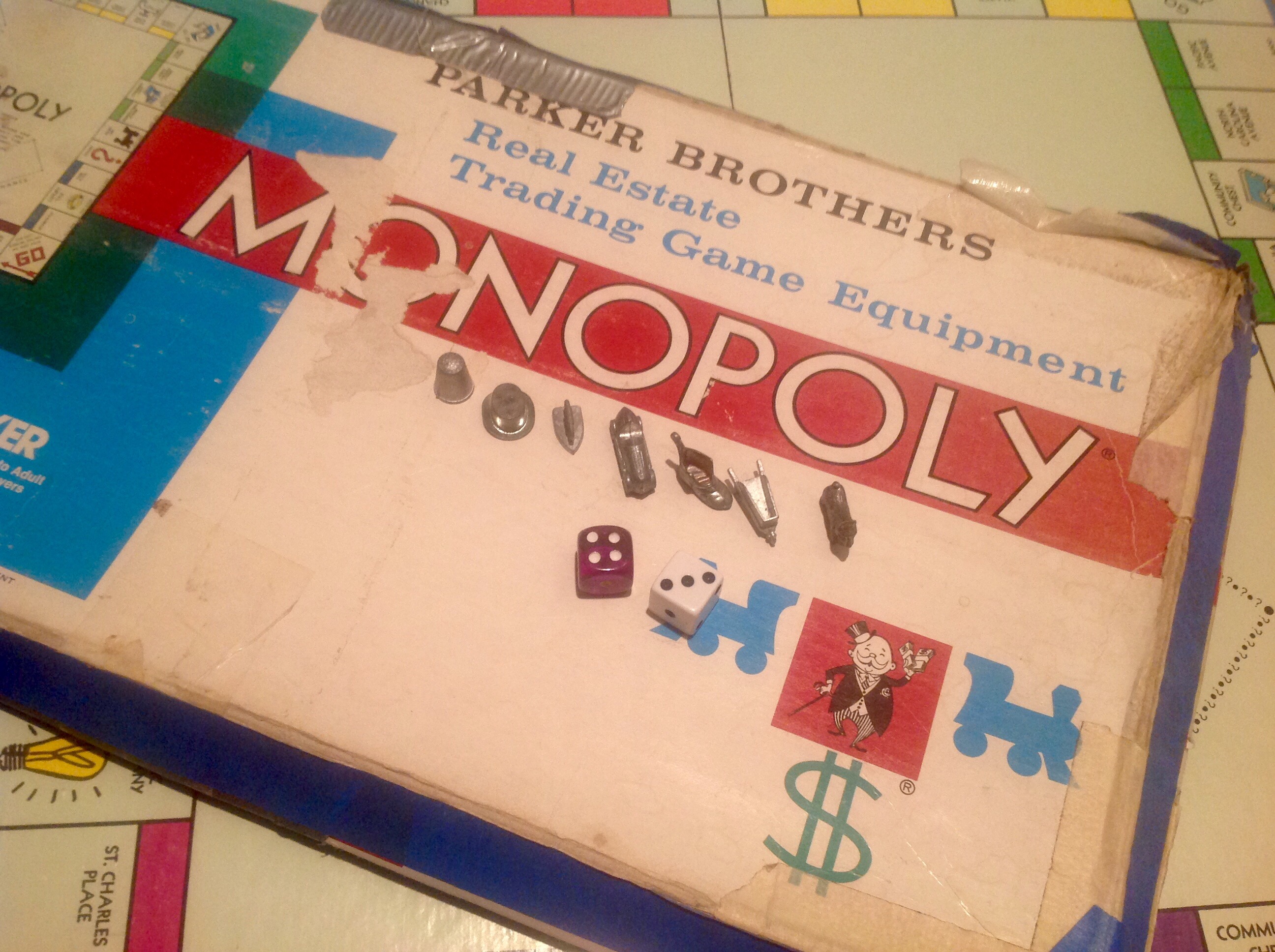
But, it’s unlikely we’ll be playing Monopoly over the coming week. We have moved on to games like King of Toyko, and Star Trek: Attack Squadron and Wings of War. My brother, Richard Bliss, is a boardgame consultant. He helps people create new games via Kickstarter and is a championship level player of a host of boardgames. My kids love when Uncle Rick comes for the holidays because he always brings a suitcase full of new games for us to try out. Our family room has an entire bookshelf devoted to games, old and new.
We are also a house full of computers. We have six or seven computers, a couple of tablets, a half dozen smartphones and an XBox. We have games for our electronic devices as well, of course. In addition to access to online games.
With teenagers, we’ve been very cautious about online games. Maybe because I’m in the computer industry, I have more of a concern about online safety and the potential dangers of online game playing. Recently we decided that kids could no longer play online games on the home computers. We found that after a session of online play, the computers were overly slow. Maybe it was simply a cache and cookies issue, but the computers are online first and foremost so that kids can do schoolwork. Even with three family computers, there is often a wait for kids to get online and post assignments or check grades.
Dad, can we still play some of the older games like Microsoft Age of Empires?
Sure, we still have the CD’s in a case downstairs.
My son went to install Microsoft Age of Mythology on our Windows 7 computer. It installed successfully, but that’s where we ran into an issue. Despite my and his best efforts, along with several potentially helpful Google searches, we could not get Age of Mythology to run.
I thought about the business model that not just Microsoft, but all the computer game makers have convinced us to buy into. I have no idea how old my Monopoly game is. The instruction book is long gone. The board says the trademark was last updated in 1961, although my copy of the game is probably only 25 years old or so. And it is still as playable as the day we bought it. (Well, unless you want to play as the battleship.)
Age of Mythology was released on October 30, 2002. And while we can still insert the CD, the game is useless. I have disks for Microsoft Arcade. This was a collection of classic arcade games from the 1980’s like DigDug, Pole Position and Galaga.
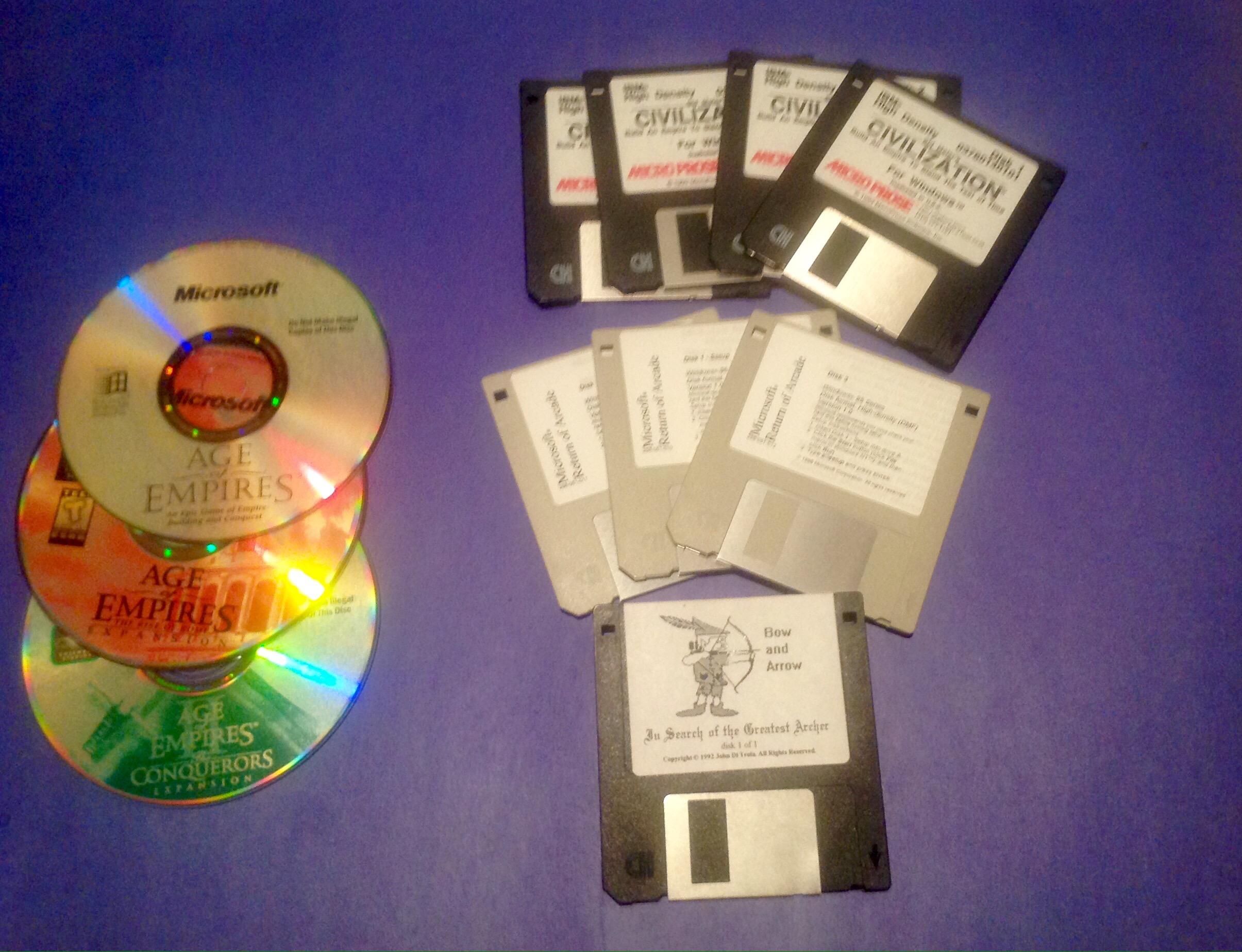
Not only will these games not play on Windows 7, modern computers don’t even include the floppy disk drive that would be required to install them.
This is a great deal for the computer game companies. I paid $30 for my copy of Monopoly thirty years ago and there is little chance I’m going to give Parker Brothers another $30 for an updated copy. (Well, unless I really want to play as the battleship.) However, every few years I need to refresh my computer game library. Even now, the newest XBox games are written for the XBox One. My XBox 360 is headed toward planned obsolescence sooner rather than later. The $50 game that I buy today, like a carton of milk, has an expiration date. It might not be stamped on the DVD case, but the game companies know that I’ll be back in a couple of years to get the newest version.
Online games are even worse in that respect. The subscription model means that I can play as long as I like. As long, that is, as I continue to pay them for the privilege. Again, there’s a tradeoff for the gamers. For a small fee, I can have constant access to the very latest and greatest cutting edge technology and graphics. But, I can’t help but wonder at what cost we get that convenience and those features.
The problem is more than just games. I worked at WordPerfect years ago. And while it might seem like Microsoft Word document format is the way files are and always were stored, I remember the days when you picked your own file extensions. You could use those last three characters to seperate out files like
Rodney.rsm
might be my current resume. I recently stumbled on an old collection of files that I’ve been faithfully copying from one computer to another as I upgraded over the past 20 years. There was a folder (we called them directories back then) full of old work files in an ancient WordPerfect format. I tried several different programs and processes for opening them. None worked. I finally gave up and deleted them. They weren’t all that important anyway. . .I don’t think.
But, suppose they were. Suppose they had been letters from my father who passed away years ago? Suppose they were my early journal entries? Suppose they were family pictures from twenty years ago?
We are a throw away culture. Technology marches on, and I’m one of those right at the front pushing the boundaries. But, at what cost? Am I simply pining for “the good old days”? Is it just that I’m old and afraid of change? I don’t think so.
We may find ourselves at some point with an electronic box of Super 8 files in an age of DVD players. Two things stand out to me. First, there will no doubt be people with access to really old technology who will take your old WordPerfect documents or ancient picture files or old video files and for a fee convert them to the newest format. Like futuristic VHS -> DVD conversion companies, there will be an entire micro industry designed to recover your electronic memories.
Second, I should print more. I have books that were written in the 19th century. Those books are still as accessible as ever. I’ll be able to play my copy of Monomopoly with my grandkids. Our photo albums will be around as long as the paper holds up. At some point it will be useful, important even, to print my memories out on the pulp of dead trees. Who knows, that time might be here already. No one ever lost a copy of a printed book because their hard disk crashed.
The Age of Mythology story had a happy ending. While I save my old DVDs, I also save my old computers. My son dug out an old Pentium-based computer running Windows XP and the game installed and ran flawlessly.
Rodney M Bliss is an author, columnist and IT Consultant. His blog updates every weekday at 7:00 AM Mountain Time. He lives in Pleasant Grove, UT with his lovely wife, thirteen children and grandchildren.
Follow him on
Twitter (@rodneymbliss)
Facebook (www.facebook.com/rbliss)
LinkedIn (www.LinkedIn.com/in/rbliss)
or email him at rbliss at msn dot com(c) 2015 Rodney M Bliss, all rights reserved
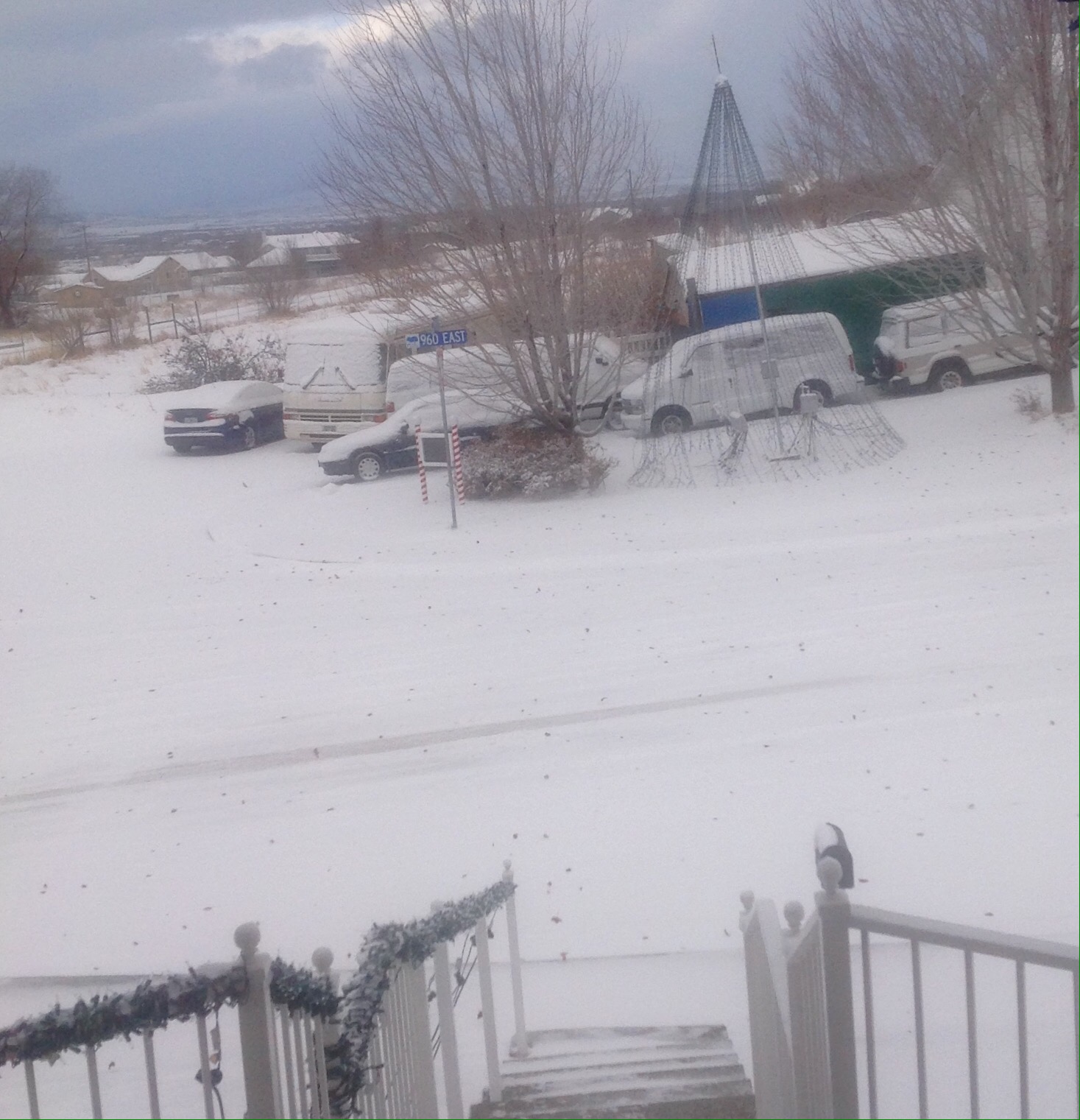
Hey, Traci. What’s up?
Rodney, are you guys alright?
Sure. . .why do you ask?
I just saw the news. Looks like they declared a state of emergency and called out the National Guard in Utah. Are you safe?
Ha ha. Yes, we’re all fine.
What happened?
It snowed. It snowed a lot, but this is Utah. It’s just snow.
The year was 1993. A series of winter storms came roaring in off the Pacific just after the new year burying the northern part of the state in 42″ of snow by January 13th. Even before counting the snow the rest of the month, that set a record for the snowiest month in Utah history.
I was working for WordPerfect as a 3rd tier support specialist. Each of us on the S.W.A.T (Strategic WordPerfect Assistance Team) team had a group of clients that were ours. It was one of the first Technical Account Management positions created in the computer industry. (How I Saved The EPA, Don’t Tell Pete) Allstate was one of my clients and Traci was my contact there. I’d been out to their headquarters in Northbrook, IL, suburb of Chicago, several times. And Traci had been to our headquarters in Orem, UT.
People from Illinois, and especially Chicago are used to snow. I lived there for two years in the mid 1980s. The “lake effect” could bring bitter cold temperatures and lots of snow. Utah lacks the cold that Chicago can experience. We get a lake effect as well. The Great Salt Lake can bring us more snow in the winter, but because of the lake’s high salt content, it doesn’t freeze. And all that liquid acts like a great big radiator. It keeps the Salt Lake valley from getting bitter cold.
But, lake effect, along with storms off the Pacific can contribute to lots of snow. And in 1993, we got lots of snow. The first storm came through January 2nd, dumping 9 inches at the airport. Three storms the following week dumped 6″, 6″ and then 8″. Three days later another storm and another 7″.
Shoveling driveways became a constant task. In fact, by the time you’d reached the street, the pavement near the house was already covered again. Homeowners were busy, but the snowplows were running round the clock. And that’s what eventually lead to the Army getting involved.
Growing up in the greater Seattle area, and during a nearly 10 year career at Microsoft, snow was an event. More than two or three inches and the city shut down. It’s easy to point and laugh at those wimpy Washingtonians who can’t drive in the snow. But, the truth is that it’s more about the city than the drivers. I remember one snow storm in Seattle that dumped 25″ at Christmas time. It took the city days to recover. During the news stories it was revealed that the entire city of Seattle owned two snowplows. My little town of Pleasant Grove, UT has more than that. It’s hard to clear the streets if you don’t have a fleet of snowplows.
All Utah towns have snowplows, and salt trucks and sand trucks. But, those trucks have to be driven by people. And even if the equipment can run 24×7, the people can’t. In the first few weeks of 1993, the snowplows were out in force, clearing the roads. Again and again. And again. And still again. At one point there was a story about an altercation between a snowplow driver and a homeowner. The snowplow threw a berm of snow across the person’s freshly shoveled driveway. The homeowner had had enough. Grabbing his shovel he chased the snowplow smacking any part he could reach with the plastic shovel.
The governor realized that something had to change.
Can we get the National Guard to relieve the snowplow drivers?
You can only call out the National Guard if you declare a state of emergency, Governor.
So, he did. He declared a state of emergency and pulled the exhausted snowplow drivers out of their trucks and replaced them with Utah National Guardsmen. The story got national attention and my friend from Illinois called to check on me.
Utah is in the middle of another winter storm today. This one won’t rival the storm of 1993, but it’s making travel hazardous. Some things haven’t changed in the twenty years since those storms of the early 1990s. I’m still working in technology. I’m back to working as a TAM. And it still snows in Utah in the winter. The biggest difference is that unlike twenty years ago, I can sit in my nice warm house and watch the blowing snow while doing my job from home.
Times like this I really love technology.
Rodney M Bliss is an author, columnist and IT Consultant. His blog updates every weekday at 7:00 AM Mountain Time. He lives in Pleasant Grove, UT with his lovely wife, thirteen children and grandchildren.
Follow him on
Twitter (@rodneymbliss)
Facebook (www.facebook.com/rbliss)
LinkedIn (www.LinkedIn.com/in/rbliss)
or email him at rbliss at msn dot com(c) 2015 Rodney M Bliss, all rights reserved
No river is too wide or too deep for me to swim to you
Come whenever I’ll be the shelter that won’t let the rain come through
Your love, it is my truth
And I will always love you
Love you, love you– “Remedy” by Adele
This is a computer post. But, I want to start with Adele. I’m not normally a modern pop music fan. The artists are talented, but I’m not their target demographic. Country music? 80’s music? Jazz? Sure, but not so much the Top 40 stuff. But, I’ve been trying to expand my musical appreciation. (What Imagine Dragons and Bruno Mars Taught Me About My Job) So, like about a million other people, I bought Adele’s new album, 25. I like it.

The other day, I noticed the above lyric; not the love references or even the second line with its beautiful metaphor about shelter and rain. The first line however struck me as wrong.
I live near a lake.
 Utah Lake is almost 150 square miles in area. It’s the largest non-dam controlled lake in the western United States. While it’s big, it’s not very deep. It’s average depth is about 10.5 feet. You’d think that would make you feel safe, right? Sure, you cannot stand up in a 10 foot lake, but like Adele’s lyrics reference, you don’t have to worry about it being too deep to swim across.
Utah Lake is almost 150 square miles in area. It’s the largest non-dam controlled lake in the western United States. While it’s big, it’s not very deep. It’s average depth is about 10.5 feet. You’d think that would make you feel safe, right? Sure, you cannot stand up in a 10 foot lake, but like Adele’s lyrics reference, you don’t have to worry about it being too deep to swim across.
Here’s where Adele got it wrong. The shallowness of Utah Lake is its greatest danger. We get a lot of wind in Utah. The entire greater Salt Lake City area sits in a big bowl formed by the surrounding mountains. When a storm comes through, the winds comes roaring down our canyons, or blow across the top of the bowl, only to hit the mountains on the far side and “curl” back under. It’s not unusual to have high clouds moving south and the wind on the family floor blowing north.
That wind blows across Utah Lake and turns a smooth lake into a churning maelstrom in a matter of moments. And it’s the shallowness of the lake that makes it worse. The water is easily pushed around by the surface wind. Tragedies occurs every summer. Boats get swamped, or boaters simply fall out of their boat in a sudden storm. They then don’t have the strength to fight the wind and waves to swim back to their boat.
We have another lake in Northern Utah called Bear Lake. It’s less than half the size of Utah Lake, at 109 square miles. Bear Lake is 94 feet deep on average; nearly 10x deeper than Utah Lake. And yet, that depth helps make Bear Lake less dangerous than Utah Lake. Winds blowing across Bear Lake can’t really move the water around like they do further South on Utah Lake.
We tend to think of deep as dangerous and shallow as safe. That’s what Adele was singing about. And yet, in many cases it’s just the opposite. There are parallels in the IT computer world. I want to talk about two.
Passwords
No one would be surprised when we say that long passwords are safer than short ones. If you have a PIN for example and it’s 4 characters long, there are 10,000 possible combinations, 0000-9999. Increase that PIN length to 6 characters and you now have a possible 1,000,000 possible combinations, 000000-999999. It would be possible, if tedious for someone to try 1000 combinations. You may have done this if you ever forgot the combination on a suitcase. It’s virtually impossible for a single person to try 1,000,000 combinations. A password can include numbers and special characters allowing for many more combinations. Clearly longer is better.
And yet, you can take that logic too far. I have a system that I log into daily. I’ve set up my phone to automatically log into it. Occasionally, I need to access the site from my laptop and then I run into a problem. I know I have a strong password, and I know kind of what it is. But, it often takes me multiple tries to remember it. Finally, after the third failed attempt the system asks if I want to recover my password. Sure, that’s why password systems are built the say they are. The problem is that the system doesn’t actually recover my password. Instead it assigns a new password and emails that to me. This wouldn’t be a problem except that system generated password looks like x7JV2bk9A. Of course, I want to change it right away to something I can remember. As I reset it to my normal password, I get an error.
YOU’VE ALREADY USED THAT PASSWORD. PLEASE CHOOSE A NEW PASSWORD.
I’ll try all of my common passwords. And each one in turn will be rejected. Finally, I will find a unique password that is close to my normal password naming scheme, which includes a pass phrase and a sequential number. I then update my phone with this new password and things go back to normal until the next time I have to access this system from my laptop and I restart the entire process. The alternative is to write down my password. Now I’ve taken a system designed to be extra secure and made it less secure by having my password written down.
Like a shallow lake, a complex password might seem safer, but can actually result in a less secure system.
Cryptography
Another situation that turns the conventional wisdom of “longer is better” is the science of cryptography. This includes secret codes, but also trying to decypher ancient languages. I admit I’m not an expert on making and breaking codes. I’ve read several books on it and find the concepts fascinating. The success of the Allies in WWII was aided greatly by the work done to break both the German codes and the Japanese codes. Alan Turing was one of the pioneers of Computer Science and was instrumental in breaking the German codes and figuring out the Enigma code machines.
One of the ironies of code breaking is that the longer the message, the easier it is to break. All languages have patterns. Some words are more common than others. Some letters are used more often than others. The larger sample you have to analysis the more likely a code breaker will be able to spot some of those patterns. This is the same pattern that linguists, or archeologists, or archeological linguists use to attempt to decipher ancient languages. They look for patterns and try to connect the dots. Egyptologists spent years attempting to decipher Egyptian heiroglyphics.
In July, 1799 French soldiers in Egypt found a stone near Rosetta Egypt that included text written in both Greek and Egyptian hieroglyphics, and a centuries old cryptography puzzle were finally solved. When it comes to breaking codes, or deciphering text, more is better.
–
Sometimes what we think makes sense, actually is exactly the opposite of what we think. Adele wrote a beautiful song about helping the ones you love. The symbolism she seemed to be using was the idea that wide and deep separations between two people can be hard to overcome. But in reality, sometimes a deep lake (or River) is safer, or easier to cross than a shallow one.
I doubt that crypto specialists or security analysis to are looking to pop music for inspiration on creating more secure system. But at least it’s some nice music to play in the background while they are working.
Rodney M Bliss is an author, columnist and IT Consultant. His blog updates every weekday at 7:00 AM Mountain Time. He lives in Pleasant Grove, UT with his lovely wife, thirteen children and grandchildren.
Follow him on
Twitter (@rodneymbliss)
Facebook (www.facebook.com/rbliss)
LinkedIn (www.LinkedIn.com/in/rbliss)
or email him at rbliss at msn dot com(c) 2015 Rodney M Bliss, all rights reserved
Okay, this time you picked a good anniversary present.
Ah, thanks.
You don’t get it right every year, but this year you did.
Of course, the “it” in the title is the new Star Wars movie, The Force Awakens. This post is not a review of the movie. I liked it. I’ve seen the movie twice. The second time I saw it was last Saturday at my daughter’s work party.
“Dad, do you want to come watch Star Wars with my coworkers and me?”
How could I turn that down? The first time, though, was Thursday night before it officially opened. My friend Caleb threw a party for a few hundred people. I was taking my wife out on a surprise date for our wedding anniversary. It was that party that I want to write about.
My friend is not a project manager. He’s not an event planner. In fact, he’s a music conductor. He’s also a Star Wars fan. A few months ago he posted online and asked, “Who would be interested in a Star Wars viewing party?” Several of us chimed in and expressed interest. And that’s where I left it. I expected a small get together with friends. So, how did it turn into an catered event for 350 people?
It’s an interesting study in project management and especially scope creep. An important point is that this was not Caleb’s first movie viewing party. He also put together a party for viewing the last Hobbit film. Saturday night, I saw his wife taking tickets. Their kids were checking people’s ID at the food line. I asked his wife about it.
So, Caleb decides to have a party and the entire family has to work?
You mean, Caleb decided to have a party for 350 people?
Yeah, I was expecting a small get together.
Well, that’s what we did with the Hobbit. It was at the studio. I cooked some food and it was a few friends. This? This is a whole different level.
How had a gathering of a few friends turned into a catered affair at the largest capacity theater in Orem, Ut? Two words: Scope Creep.
Caleb started looking for a venue and got in contact with the manager for the theatre. The manager suggested that rather than rent the theatre, they could expand the event.
You know, we could cater it and you could have it here.
By the time they were done, there was not only catering, but a cantina band in full costume, actors wearing Star Wars costumes as backdrops for the professional photographer, multiple Star Wars memorabilia displays, custom Star Wars Cups, popcorn buckets, and VIP badges.
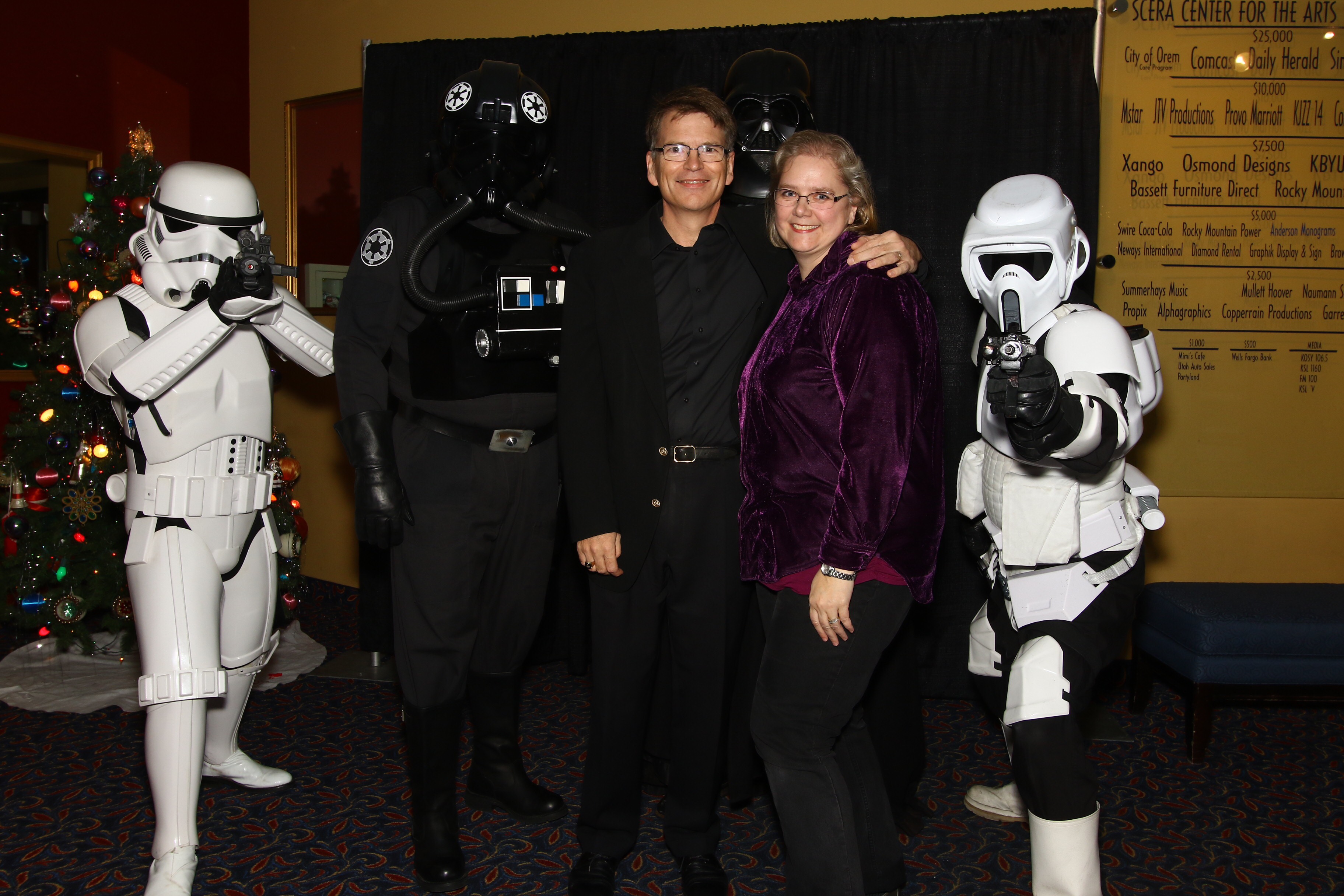
Tickets ranged from $20-$35 each. And (probably) because of a licensing issue, the ticket didn’t include the cost of the movie. Pay to come to the party and you get to see the movie for free. I once gave a Subaru Brat to a guy who paid me $1200 for the wheels.
As I sat in the Catina with my lovely wife enjoying the food and the music, the project manager side of my brain thought through the various tasks that would need to be considered for a function like this.
- Schedule: Pretty much set since it was tied to the release of the film
- Budget: 350 people times an average of $25 per person = $8,750
- “Features”: Food, Pictures, band, drinks, pop corn and the theatre
I was impressed with the entire experience. It reminded me that project and program management, while closely tied to software projects, actually have concepts that can be applied to any project.
Even one set a long time ago in a galaxy far, far away.
Rodney M Bliss is an author, columnist and IT Consultant. His blog updates every weekday at 7:00 AM Mountain Time. He lives in Pleasant Grove, UT with his lovely wife, thirteen children and grandchildren.
Follow him on
Twitter (@rodneymbliss)
Facebook (www.facebook.com/rbliss)
LinkedIn (www.LinkedIn.com/in/rbliss)
or email him at rbliss at msn dot com(c) 2015 Rodney M Bliss, all rights reserved
You cannot believe how hard it has been to wait on writing that headline. (If you are just here looking for the new maxims, they are at the bottom. Go ahead, scroll down, we’ll wait.)
One of my favorite Christmas gifts every year has been the new Schlock Mercenary calendar. In fairness, I had to buy them as presents to myself. Still, they were one of the things I looked forward to every year. This year, as most Schlock Mercenary fans already know, Howard made the decision to not do a calendar. He explains his reasoning here. It boils down to really two reasons; decreasing calendar sales have made it no longer financially viable, and the Planet Mercenary RPG took up some of the cycles that would have been used to make a calendar.
Part of the attraction of the calendars, of course, was getting to read new maxims. Each calendar included the next 12 maxims. Sometimes this meant getting reacquainted with old friends.
Maxim 37: There is no overkill There is only open fire, and reload.
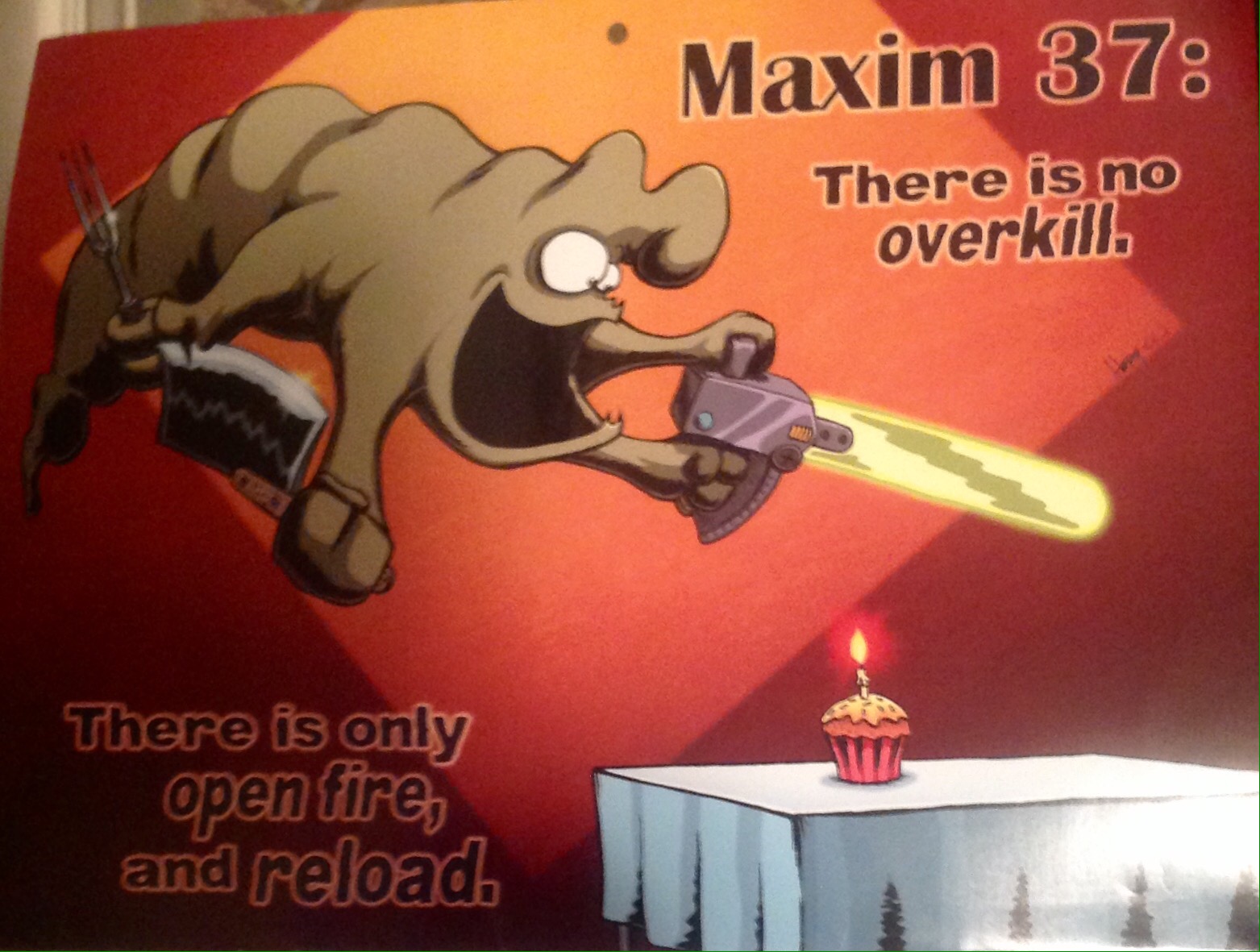
Other times this meant meeting new, never before read maxims.
Maxim 46: Don’t try to save money by conserving ammunition.
(My personal favorite for purely selfish reasons.) 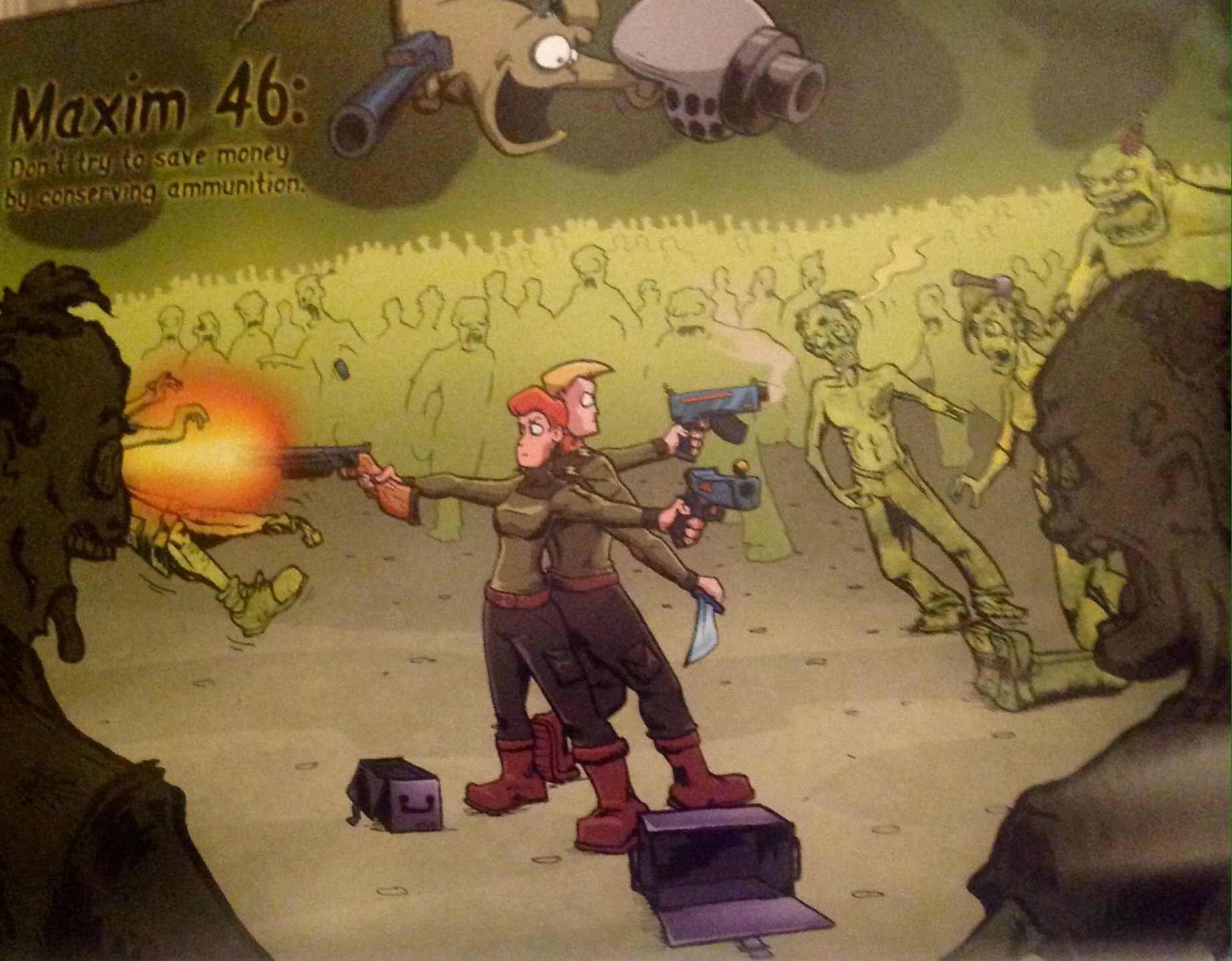
So, as we contemplated a year of no new maxims and someone else’s art work hanging in my cubical, I asked Howard to let me post the remaining maxims as a sort of Christmas gift for the fans. Someone named Tayler, but not Howard pointed out that
- Howard may already have a plan for that
- The 70 Maxims of Maximally Effective Mercenaries book was part of the recent Kickstarter campaign
Okay, you won’t be reading all the remaining maxims here. But, Howard was gracious enough to share a couple of the new ones. I also had a chance to talk to Howard a little about the maxims and how he felt about writing the last of them.
[Rodney M Bliss] Originally “The 70 Maxims of Maximally Effective Mercenaries” was titled “The 7 Habits of Highly Effective Pirates.” Why the name change?
[Howard Tayler] Because Franklin Covey AGGRESSIVELY defends their trademark for “The 7 Habits.” They sent me a cease and desist letter.
[RMB] Did you consider fighting them?
[HT] Not really. Actually, the first use of “The 7 Habits of Highly Effective Pirates” predates their trademark filing by 3 years. But, they can afford a lot of attorneys that would have overwhelmed us. We would have lost
[RMB] If you had been able to win, would you have kept the name?
[HT] If I had been able to win I would have wrung every bit of concessions out of them that I could and then I would have changed the name anyway. When I got their letter, my first reaction was almost panicked. I was very upset, worried, and distraught. I showed it to some of my friends who are also authors. They gave me some good advice. Part of that good advice was that a new name would be better.
[RMB] A name that would be your own creation?
[HT] Exactly. I just substituted 70 for 7, maxims for habits and mercenaries for pirates. So, we really would have changed the name anyway.
[RMB] When you got the letter did it offer a sense of validation? The idea that if an organization as big as Franklin Covey was interested in you, it carried a certain amount of legitimacy?
[HT] None at all. They just did an online search for “7 Habits.” From the very beginning Schlock Mercenary has been very searchable.
[RMB] You went back and changed all references in the past strips. Why?
[HT] I wanted it to be internally consistent. Plus, I didn’t want to sell merchandise that had the banned name. And I really didn’t want to have to go back and reprint merchandise later. So, as we reprinted the books, we included the new title.
[RMB] As you finished writing the last of the maxims, were you worried at all that you might need a maxim in the strip and not have the freedom to write a new one?
[HT] Not at all. Look at it this way. If there are 5000 strips and I used every maxim as a punchline, that’s 70 out of 5000 and that’s already too many. Seventy doesn’t sound like a lot, but to the reader it would start to sound ubiquitously redundant. I can still refer to them at a high level without making them the punchline. If I can make an average of four references to each Maxim, that’s 280 possible Maxim-based jokes with different references. That’s a huge number.
[RMB] Was there any sense of loss when you wrote the last of them?
[HT] No
[RMB] Some of the maxims are true. We just saw a story about John Fox, an officer in WWII who was awarded the Medal of Honor for calling down an artillery strike on his own position to stop an enemy advance, (Maxim 20: If you’re not willing to shell your own position, you’re not willing to win.) Some are false. Does that worry you at all? Do you feel a sense of ownership knowing that some of the maxims are bad advice?
[HT] Can you think of any book that is 100% correct? I wrote them this way by design. It’s important that they can be both right and wrong. And sometimes they are right in one situation and wrong in another. I’m not writing a business book. This is an in-world artifact. That’s the difference between writing a fictitious advice book and a real one.
[RMB] You’ve done lots of non-comic stuff, coins, Planet Mercenary RPG and the upcoming 70 Maxims book. Has that been distracting?
[HT] It hasn’t been distracting at all. It has certainly been time consuming. But, I’m using time that I used to do other things to focus on these other projects. For example, much of my miniature painting time has been taken up by the Planet Mercenary Art Editor work. But there’s a planned end to that work. I can suspend my hobby to focus on this for a while. But, it doesn’t really distract me from the comic, because it meshes perfectly with my work on the comic.
===============================
For reference here are the official Maxims as listed on the Schlock Mercenary Wiki (with some additions from the 2014 and 2015 calendars)
1. Pillage, then burn.
2. A Sergeant in motion outranks a Lieutenant who doesn’t know what’s going on.
3. An ordnance technician at a dead run outranks everybody.
4. Close air support covereth a multitude of sins.
5. Close air support and friendly fire should be easier to tell apart.
6. If violence wasn’t your last resort, you failed to resort to enough of it.
7. If the food is good enough, the grunts will stop complaining about the incoming fire.
8. Mockery and derision have their place. Usually, it’s on the far side of the airlock.
9. Never turn your back on an enemy.
10. Sometimes the only way out is through. . . through the hull.
11. Everything is air-droppable at least once.
12. A soft answer turneth away wrath. Once wrath is looking the other way, shoot it in the head.
13. Do unto others.
14. “Mad Science” means never stopping to ask “what’s the worst thing that could happen?”
15. Only you can prevent friendly fire.
16. Your name is in the mouth of others: be sure it has teeth.
17. The longer everything goes according to plan, the bigger the impending disaster.
18. If the officers are leading from in front, watch out for an attack from the rear.
19. The world is richer when you turn enemies into friends, but that’s not the same as you being richer.
20. If you’re not willing to shell your own position, you’re not willing to win.
21. Give a man a fish, feed him for a day. Take his fish away and tell him he’s lucky just to be alive, and he’ll figure out how to catch another one for you to take tomorrow.
22. If you can see the whites of their eyes, somebody’s done something wrong.
23. The company mess and friendly fire should be easier to tell apart.
24. Any sufficiently advanced technology is indistinguishable from a big gun.
25. If the damage you do is covered by a manufacturers warranty, you didn’t do enough damage.
26. “Fire and forget” is fine, provided you never actually forget.
27. Don’t be afraid to be the first to resort to violence.
28. If the price of collateral damage is high enough, you might be able to get paid for bringing ammunition home with you.
29. The enemy of my enemy is my enemy’s enemy. No more. No less.
30. A little trust goes a long way. The less you use, the further you’ll go.
31. Only cheaters prosper.
32. Anything is amphibious if you can get it back out of the water.
33. If you’re leaving tracks, you’re being followed.
34. If you’re leaving scorch-marks, you need a bigger gun.
35. That which does not kill you has made a tactical error.
36. When the going gets tough, the tough call for close air support.
37. There is no ‘overkill.’ There is only ‘open fire’ and ‘I need to reload.’
38. Just because it’s easy for you doesn’t mean it can’t be hard on your clients.
39. There is a difference between spare parts and extra [parts].
40. Not all good news is enemy action.
41. “Do you have a backup?” means “I can’t fix this.”
42. “They’ll never expect this’ means “I want to try something stupid.”
43. If it’s stupid and it works, it’s still stupid and you’re lucky.
44. If it will blow a hole in the ground, it will double as an entrenching tool.
45. The size of the combat bonus is inversely proportional to the likelihood of surviving to collect it.
46. Don’t try to save money by conserving ammunition.
47. Don’t expect the enemy to cooperate in the creation of your dream engagement.
48. If it ain’t broke, it hasn’t been issued to the infantry.
49. Every client is one missed payment away from becoming a target.
51. Let them see you sharpen the sword before you fall on it.
And for the first time ever, here are two new maxims.
Maxim 64: An ounce of sniper is worth a pound of suppressing fire.
Maxim 68: Negotiating from a position of strength does not mean you shouldn’t also negotiate from a position near the exits.
Howard has created a world rich in interesting life forms, galaxy spanning stories, lots of mayhem and of course, a daily dose of funny. Follow the daily adventures of his eclectic collections of maximally effective mercenaries at www.schlockmercenary.com.
This is the fifth and final installment of a series on Howard Tayler and Schlock Mercenary.
Monday – Interview with cartoonist Howard Tayler
Tuesday – Interview with Business Manager Sandra Tayler
Wednesday – A Day in the Life photo essay of the cartoonist process
Thursday – Howard Tayler answers pre-submitted Fan Questions
Friday – New Maxims Revealed
Rodney M Bliss is an author, columnist and IT Consultant. His blog updates every weekday at 7:00 AM Mountain Time. He lives in Pleasant Grove, UT with his lovely wife, thirteen children and grandchildren.
Follow him on
Twitter (@rodneymbliss)
Facebook (www.facebook.com/rbliss)
LinkedIn (www.LinkedIn.com/in/rbliss)
or email him at rbliss at msn dot com(c) 2015 Rodney M Bliss, all rights reserved

